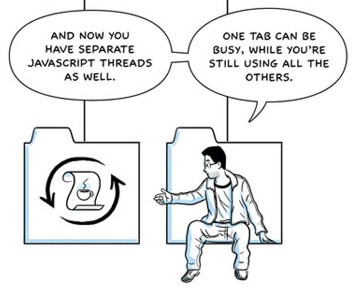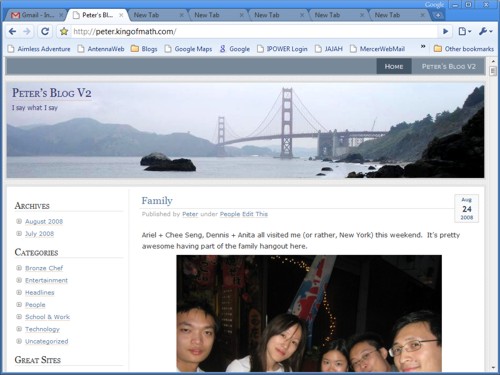Google has released its own Web browser today (at noon PDT), and I installed it on both my work and home computers within 15 minutes. I had not been so eager to try a newly released software since Internet Explorer 4, and I actually didn’t learn about this one until a few hours before its release.
Introducing Google Chrome, the potential next big thing in your life that Google has control over. It looks like a cleaner and sleeker version of FireFox. It’s supposed to be technologically “next generation” compared to all existing browsers with its multi-processor model. And it’s open source (not that it means a lot to a non-programmer like myself). And it’s got a very educational and geeky comic introducing its background and technical structure.

The comic was pretty long, but showed a very refreshing concept for web browser design. I’m not enough of a techie to know if it’s actually as good as it sounds, but it does sound to make a lot of sense. It’s the most unique comic I’ve ever read, and you won’t appreciate it if you’re a non-geek.

From the few forums I visited between 2pm and 3pm today, Google Chrome seems to get a lot of resistence from current FireFox users. FireFox is a great browser, but I never used it much due to Microsoft’s traction (of if you prefer, inertia). Started 11 years ago on IE3, which soon upgraded to IE4, beat down Netscape, and dominated the market. The active desktop and dynamic content stuff was so awesome that no teenage tech-savvy boy could resist. IE continued with the lead through V5, until FireFox came to take back the web. Yet, well, folks like me decided to stick with something from the big monopoly that they could trust (or simply, were more used to).
But somehow when Chrome came about, which was not that many hours ago, I abandoned my old friend Microsoft. Something from Google must be trust worthy, since they’re dominating the Internet just like how Microsoft dominated the PC software market. After all, if I’m gonna spend most of my online experience with Google Search, Gmail, Google Maps, etc, might as well use a client-side software that’s guaranteed to be compatible with the system, right? That was totally my reasoning for sticking with IE, too.